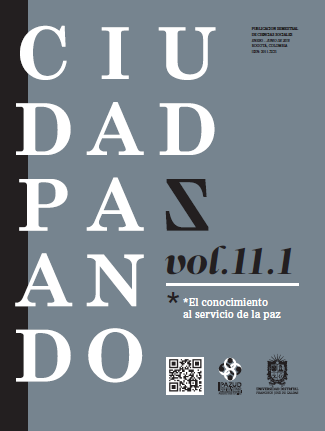DOI:
https://doi.org/10.14483/2422278X.12686Published:
2018-06-30Issue:
Vol. 11 No. 1 (2018): Enero - junio. El conocimiento al servicio de la pazSection:
Dossier centralLas migraciones y la profundización de la crisis socioambiental
Migrations and the deepening of the socio-environmental crisis
Migrações e o aprofundamento da crise socioambiental
Keywords:
migraciones, migrantes ambientales, desplazados ambientales, crisis ambiental global (es).Keywords:
migrações, migrantes ambientales, ambientais, deslocados ambientais, crise ambiental global (pt).Keywords:
migrations, environmental migrants, environmental displacement, global environmental crisis (en).Downloads
Abstract (es)
Las migraciones humanas son fenómenos masivos que configuran crisis humanitarias de escala global, las cuales, en una mirada transversal, van más allá de una cuestión de derechos laborales, civiles o sociales. En el presente artículo se revisa este fenómeno desde los tópicos de las migraciones humanas como causa y consecuencia de las crisis políticas y sociales, y las migraciones como causa y consecuencia de las crisis ambientales; lo anterior con referencia a que este fenómeno puede profundizar la crisis socioambiental global, que hoy en día es percibida con mayor intensidad. Controlar y gestionar los flujos migratorios es un reto transversal e involucra el reconocimiento de los valores y limitaciones ambientales.
Abstract (en)
Migrations are massive phenomena that figure humanitarian crises on a global scale, which, in a transversal perspective, go beyond the matter of labor, civil or social rights. In this article, this phenomenon is reviewed from the following perspectives: 1) - Migrations as a cause and consequences of political and social crises. 2) - Migrations as a cause and consequences of environmental crises. The aforementioned related to the fact that this phenomenon can deepen the global socio-environmental crisis, which nowadays is perceived with greater intensity. Controlling and managing migratory flows is a "transversal" challenge that involves the recognition of our environmental values.
Abstract (pt)
As migrações são fenômenos maciços que moldam as cri-ses humanitárias em escala global, que, em uma perspectiva transversal, vão além de uma questão de direitos trabalhistas, civis ou sociais. No presente artigo, este fenômeno é revisado das seguintes perspectivas: 1) – Migrações como causa e con-seqüência de crises políticas e sociais. 2) - Migrações como causa e conseqüência de crises ambientais. O referido com referência ao fato de que esse fenômeno pode aprofundar a crise socioambiental global, que hoje em dia é percebida com maior intensidade. Controlar e gerenciar fluxos migratórios é um desafio “transversal” que envolve o reconhecimento de nossos valores ambientais.
References
Alemán, F. (Agosto, 2017). Migraciones y acceso al trabajo en España. Trabajo presentado en Migraciones y su Transversalidad. VIII Congreso internacional del Programa de Derecho, Bogotá.
Alto Comisionado de las Naciones Unidas para los Refugiados (ACNUR). (2006). La situación de los refugiados en el mundo. Desplazamientos humanos en el nuevo milenio. Barcelona: Icaria.
Avendaño, W. y Aguilar, D. (2014). Geopolítica y medio ambiente: una mirada a la problemática de los desplazados ambientales. Investigación y Desarrollo, 22(2), 283-308.
Bernik, T. (Junio 11 de 2016). Španci: ¡Turisti, pojdite domov!. Dnevnik Daily. Recuperado de https://www.dnevnik.si/1042740751
Bradol, J. (2004). A critical international order and humanitarian action. In F. Weissman. (Ed.), In the Shadow of ‘Just Wars’ Violence, Politics and Humanitarian Action (pp. 1-24). London: Hurst and Company
Dun, O. y Gemenne F. (2017). Definir la migración por motivos medioambientales. Cambio Climático y Desplazamiento, 31, 10-11.
Foucault, M. (1988). E Birth of Biopolitics. Lectures at the College de France 1978–1979. London: Palgrave, Macmillan.
Global Trends. (2013). United Nations High Commissioner Refugees. Recuperado de http://www.unhcr.org/statistics/country/5399a14f9/unhcr-global-trends-2013.html
Holland, T., Peterson, G. y González, A. (2009). A Cross-National Analysis of How Economic Inequality Predicts Biodiversity Loss. Conservation Biology, 23(5), 1304–1313.
The Guardian. Hungarian prime minister says migrants are ‘poison’ and ‘not needed’. (Julio 27 de 2010). The Guardian. Recuperad de https://www.theguardian.com/world/2016/jul/26/hungarian-prime-minister-viktor-orban-praises-donald-trump
Martin, S. (2010). Rethinking the International Refugee Regime in Light of Human Rights and the Global Common Good. En Hollenbach, D., Driven From Home: Protecting the Rights of Forced Migrants. (pp. 15-33). Washington, D. C.: Georgetown University Press.
Martin, S., Weerasinghe, S. y Taylor, A. (2013). Crisis Migration. Brown Journal of World A airs,1, 123-137.
Myers, N. (1997). Environmental refugees. Population and Environment, 19(2), 167-182.
Palacios, M. (2017). Los retos de Colombia en materia migratoria. Trabajo presentado en Migraciones y su Transversalidad. VIII Congreso internacional del Programa de Derecho, Bogotá.
Palma, M. (2015). ¿País de emigración, inmigración, tránsito y retorno? La formación de un sistema de migración colombiano. Oasis, 21, 7-28.
Rockström J. et al. (2009). A safe operating space for humanity. Nature, 461, 472–475.
Zaviršek, D. (2017) The humanitarian crisis of migration versus the crisis of humanitarianism: current dimensions and challenges for social work practice. Social Work Education, 36(3), 231-244.
How to Cite
APA
ACM
ACS
ABNT
Chicago
Harvard
IEEE
MLA
Turabian
Vancouver
Download Citation
License
Copyright (c) 2018 Ciudad Paz-Ando

This work is licensed under a Creative Commons Attribution-NonCommercial-ShareAlike 4.0 International License.
The Ciudad Paz-ando Journal (RCP) is an open access publication, without economic charges for authors or readers, whose biannual publications are made under the terms of the Creative Commons Attribution - Non-commercial - Share the same License (CC-BY-NC -SA 2.5 CO), with which others may distribute, remix, retouch, and create from the work in a non-commercial way, as long as they give credit and license their new creations under the same conditions.
The copyright holder is Ciudad Paz-ando journal, retaining all rights without restrictions, respecting the terms of the license regarding the consultation, download and distribution of the material.
When the work or any of its elements are in the public domain according to the applicable current law, this situation will not be affected by the license.
Likewise, we encourage authors to deposit their contributions in other institutional and thematic repositories, with the certainty that culture and knowledge is a good for all and for all.

